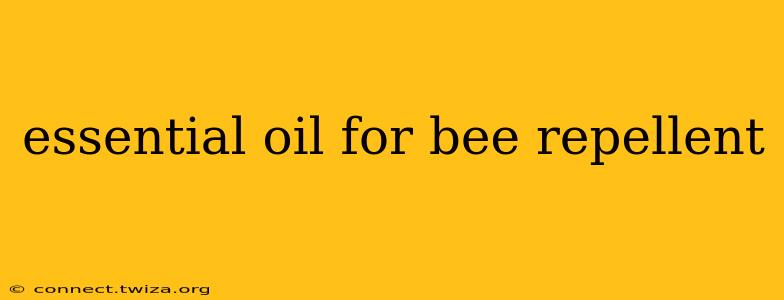Bees are vital pollinators, but their stings can be painful and even dangerous for those with allergies. While it's crucial to respect bees and their environment, understanding how to deter them from unwanted areas can be beneficial. This guide explores the effectiveness of essential oils as a bee repellent, addressing common questions and misconceptions.
Do Essential Oils Really Repel Bees?
The effectiveness of essential oils as bee repellents is a subject of ongoing discussion. While some oils exhibit repellent properties in laboratory settings, their efficacy in real-world scenarios can vary significantly depending on factors like bee species, concentration of the oil, wind conditions, and the overall environment. It's crucial to understand that essential oils are not a guaranteed bee deterrent and should not replace safe bee handling practices.
What Essential Oils Can Deter Bees?
Several essential oils have shown some promise in repelling bees, although research is still limited. These include:
- Citronella: Widely known for its mosquito-repelling properties, citronella oil also shows some potential for deterring bees. However, the effect might be temporary and less potent compared to its effect on mosquitoes.
- Lemongrass: Similar to citronella, lemongrass oil contains compounds that can disrupt bee behavior, potentially causing them to move away from the treated area. Again, its effectiveness is not guaranteed.
- Peppermint: The strong aroma of peppermint oil might be unsettling to bees, potentially causing them to avoid the area. However, this is not a consistently proven method.
- Eucalyptus: Some studies suggest that eucalyptus oil may have a repellent effect on certain bee species. More research is needed to confirm its efficacy.
- Tea Tree Oil: While not specifically studied for bee repellency, the strong scent of tea tree oil might deter some bees, but this is largely anecdotal.
How to Use Essential Oils to Deter Bees?
If you choose to use essential oils as a bee deterrent, it's crucial to do so responsibly and effectively. Remember, these methods are not foolproof and shouldn't be the sole method of preventing bee encounters, especially near hives.
- Dilution is crucial: Never apply undiluted essential oils directly to skin or around bee habitats. Always dilute them with a carrier oil, like coconut oil or jojoba oil, following the recommended dilution ratio.
- Apply sparingly: A small amount is usually sufficient. Over-application won't increase effectiveness and could be harmful to both bees and the environment.
- Focus on perimeter application: Instead of directly spraying bees, concentrate on applying the diluted essential oil around the perimeter of the area you want to protect.
- Reapplication may be necessary: The effect of essential oils is often temporary, and reapplication may be needed, especially after rain or strong wind.
Are Essential Oils Harmful to Bees?
While essential oils are generally considered less toxic than synthetic pesticides, they can still have negative effects on bees if used improperly. High concentrations or direct contact can harm or even kill bees. It's essential to use diluted essential oils sparingly and avoid applying them directly to bees or their hives. Consider the environmental impact before using any method to deter bees.
What are Safer Alternatives to Essential Oils for Bee Repellent?
Instead of relying on essential oils, consider safer and more effective alternatives to deter bees:
- Remove attractants: Bees are drawn to flowers, sweet drinks, and ripe fruit. Removing these attractants from your area is the most effective way to deter them.
- Maintain clean surroundings: Avoid leaving trash or spills that might attract bees.
- Professional bee removal: If you have a bee nest on your property, contact a local beekeeper or pest control professional for safe and humane removal.
Conclusion
While some essential oils might offer a degree of bee deterrence, they should not be considered a reliable or guaranteed solution. Their effectiveness varies, and improper use can be harmful to bees and the environment. Prioritizing safe bee handling practices and removing attractants are far more effective and responsible methods for managing bee interactions. Always remember that bees are essential pollinators, and their conservation should be a priority.
